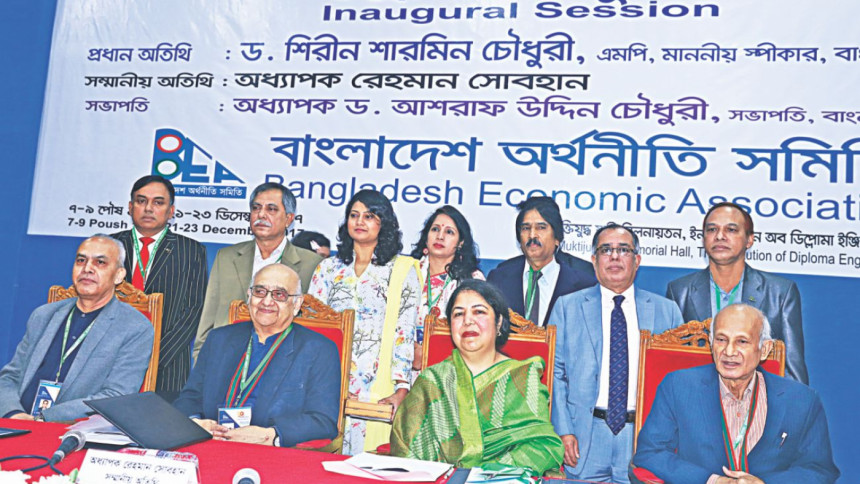Bangladesh suffers from ethical void: economist

A lack of ethics coupled with political patronage has led to a default loan culture in Bangladesh, said Rehman Sobhan, a noted economist, yesterday.
Sobhan and a couple of young researchers had identified the ethical crisis in the banking system in the 1980s.
"This problem has been perpetuating over successive regimes -- and down to the present day. In fact, you have got into a situation now where perpetuation of debt default is ingrained in the business practices."
Sobhan's comments came at the opening of 20th biennial conference of the Bangladesh Economic Association held at the Institution of Diploma Engineers Bangladesh in Dhaka.
At the opening ceremony of the three-day event, the BEA honoured economist Mahabub Hossain (posthumously), Sobhan and Ashraf Uddin Chowdhury with the BEA Gold Medal 2017.
In his speech, Sobhan, who was a member of the advisory council of the caretaker government in 1991, also spoke on the use of money in politics, perpetuation of corruption and unequal access of to justice for the common people.
Political patronage and connections have now become integral to entering the banking profession; this favour is later leveraged to accumulate personal wealth.
"This, of course, has led to the other main ethical crises: the default culture."
It reflects regulatory failure of a colossal scale and politicisation of the functioning of the regulatory system.
Now, the country has settled into a state of affairs in which most borrowers know that they do not need to repay their loans on time as they will be bailed out by way of rescheduling, according to Sobhan.
"So, now you have a built-in process of default and rescheduling."
And the worst feature of this is that it has destroyed the competitive nature of the financial sector, said Sobhan, who is the chairman of the Centre for Policy Dialogue.
"And I am not quite sure how we are going to find a way out of this."
There is also a wide disparity in the access to credit.
The low-income groups, who tend to take their debt servicing obligations sincerely, have to struggle to get credit, whereas the rich, who tend to be serial defaulters, get fresh loans easily.
"We suffer from a totally perverse and unethical situation in which the biggest defaulters tend to be elite and the most credible agents tend to be the low-income household," said Sobhan.
Subsequently, he called for ensuring wider access to credit for small borrowers as well as the small- and medium-sized enterprises.
Capital market becomes casinos
The octogenarian likened the capital market in general to casinos -- not just in Bangladesh but also in other parts of the world.
"In Bangladesh, there is not a functioning capital market that connects the savers with borrowers. The capital market has become a casino -- largely preoccupied with speculative things."
'Unethical functioning of market'
The unethical functioning of markets also bothers him, he said, adding that this does not merely mean the manipulation of markets as frequently seen in Bangladesh.
"If you have a bumper potato crop it is sold for a pittance at the farmers' door steps. The produce is then sold for Tk 20 a kg in markets in Dhaka. It demonstrates not just the imperfection in the market but the breakdown of an ethical basis for the functioning of the market."
All the value additions take place as the product goes up the value chain. As a result, the main benefits of the market are reaped by those who are engaged in the processing of the primary product or the final market.
"Here, economic theory has no solution for you beyond saying that we want competitive markets as markets are never inherently competitive. What you see is an inequitable participation in the market." Disparity in education and healthcare
There is disparity in the country's education system as well, Sobhan said.
Those who have the opportunity to buy expensive private education become self-perpetuating elites, whereas the poor, who go to low-quality schools, have their scope for upward mobility severely compromised.
Similarly, inequality exists in the access to healthcare. "You get the health services you are willing to pay for."
Workers get subsistence level wage
The former director general of the Bangladesh Institute of Development Studies took the opportunity to complement the garment entrepreneurs, citing their success in the export market.
"But the success has a deeply unjust and unethical foundation."
The entrepreneurs' competitive edge comes from the subsistence wages they pay to workers because of labour surplus in Bangladesh.
"The notion that you will have a handful of owners who will enjoy first-class global lifestyles and you will have four million women workers who will get subsistence level wages is a profoundly unethical situation. This has to be recognised."
He said the women contribute at least 50 percent to the country's GDP but they actually get a very low share of that GDP and face a variety of other inequities along the way.
'Justice tends to be one-eyed'
"We operate in a system of unequal justice," Sobhan said.
Those with resources can buy the best legal services while ordinary people have to operate in a very unequal market place for access to justice.
"You operate in a universe where justice instead of being blind tends to be one-eyed. In fact, you operate in situation where some people have protection from law, while a great many have to either buy whatever services they can or they become victimised by the whole process."
Political process is captured by people with money Sobhan also touched upon the unequal participation of people in politics.
"The political process has been captured by people with money."
This has created a serious problem as they can then use the process to enhance their wealth and go on perpetuating themselves.
"I frequently reflect that given the dominance of money in competing in the political marketplace, people like Bangabandhu and Tajuddin, who are from very modest families, would have had great difficulty in getting nominations when they stepped into politics."
Subsequently, he urged the policymakers to democratise politics such that people from all walks of life can participate.
Corruption: no one is given a signal of serious risk, Sobhan said corruption has perpetuated through patronisation over the years.
"In fact, very rarely is action taken and a lot of it tends to be politicised."
This creates a problem of moral hazard: no one believes that a serious price will be paid if he/she gets caught.
"But what people recognise is that one should be on the right side of the political line."
Re-compute GDP
He suggested for revisions in the computation of GDP. He recommended addition of household labour by women and subtracting the cost of environmental damage.
He also called for inclusion of illegal capital flight in the balance of payments accounting.
"When recomputed, you will then get an accurate measure of what is happening to the economy, who is contributing what to the economy. And then you will get an ethical appreciation of the real state of the economy."


 For all latest news, follow The Daily Star's Google News channel.
For all latest news, follow The Daily Star's Google News channel. 



Comments